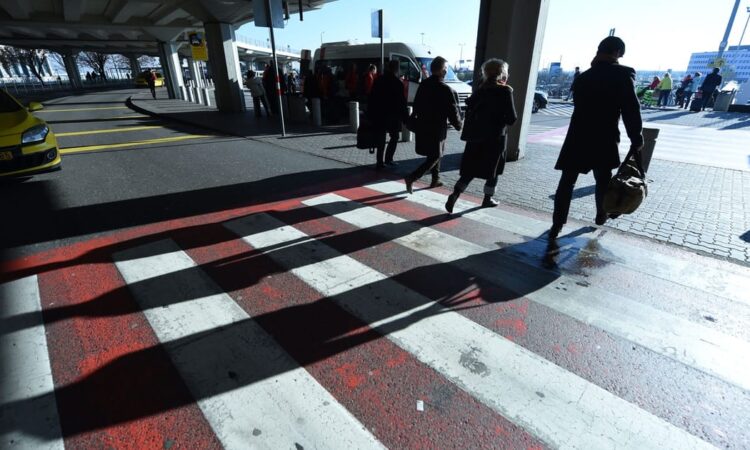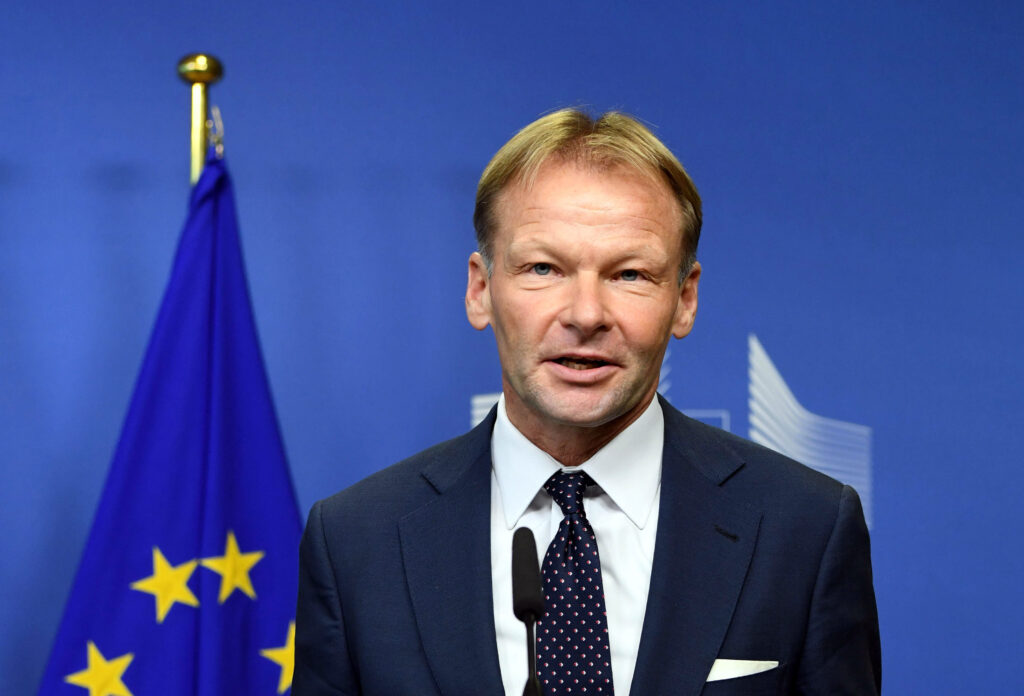
BRUSSELS — The EU’s anti-fraud office OLAF is investigating allegations of “serious misconduct” by staff at the European Investment Bank over a €200 million loan granted to Budapest Airport in 2018, according to an internal document about the probe seen by POLITICO.
OLAF investigators quizzed ex-EIB Vice President Vazil Hudák in Brussels earlier this month as a “person concerned” in approving the loan, according to the document. He was also questioned about his election to the airport’s executive board over concerns that he failed to respect a required “cooling off” period for job moves that could pose conflicts of interest.
Hudák’s questioning follows a complaint made to OLAF, seen by POLITICO, that alleges he could have received “personal benefits” from the loan’s approval.
Hudák — a former Slovakian economy minister who headed up the bank’s Central and Eastern Europe division from October 2016 to October 2019 and moved to Budapest Airport’s board in 2020 — rejected the accusation as “misleading” and “simply untrue.”
A spokesperson for OLAF said the body does not usually issue comments on cases it may or may not be investigating.
The complaint also argued that the airport’s expansion — which the loan funded — failed to comply with environmental and social standards. Hudák said he was unaware of any compliance issues.
According to the document, OLAF officials asked about the project not being in full compliance with the EIB’s social and environmental standards and whether Hudák had “exerted influence” on bank staff to disregard certain criteria during the loan’s evaluation process.
But he told OLAF officials that this would be “impossible” given the number of teams involved in making a decision on a loan, adding that the project was already being worked on by EIB staff before he started as vice president, according to the document.
“Frankly, if I wanted to, I would not even know how I would be able to exert any influence,” his written statement to OLAF said. “Given the number of staff involved and the complexity of the decision-making, it is impossible. Everyone has to agree in this long project cycle approval.”
Missing environmental checks
Following complaints in March 2020 by two NGOs, Friends of the Earth Hungary and the Hungarian group Association for Civilized Air Transport, the bank’s internal complaints procedure ruled that the climate impacts of the project hadn’t been properly assessed, nor had the airport engaged enough with the local community.
In a report dated Oct. 2021, the bank’s complaints department said it “did not find any evidence” that the airport had carried out even a preliminary check on whether an environmental assessment was required for parts of the project where construction had already started.

The airport had argued this was because it had already secured a “block exemption” to environmental due diligence, which meant it didn’t need individual exemptions for every part of the construction process.
But the bank’s complaints department said it found no proof of that.
Any documents that were available in relation to the construction permits “did not take into account the climate related and cumulative impacts of the EIB-financed project,” the report said, even though that is required under EU law.
The report recommended that, before moving on with the project, the bank should require the airport to conduct “at least a screening” and come up with measures aimed at mitigating the increase in noise pollution.
The EIB continued to finance the project without either of those measures.
Asked why the EU’s investment bank had proceeded with the loan despite the lack of environmental assessments, Hudák told POLITICO by email that the loan was “prepared by the EIB staff” and “approved by the EIB management committee as a collective decision-making body as well as by the board of directors.”
Revolving door
What made the EIB’s continued backing of the project so contentious is the announcement of Hudák’s move to a post on the Budapest Airport’s executive board in January 2020, three months after leaving his job at the Luxembourg-based institution.
That’s despite internal bank rules which said vice presidents were supposed to take 12 months of gardening leave before switching to any role that raised a potential conflict of interest.
An EIB spokesperson told POLITICO the bank had learned of the job move from media reports, adding that Hudák told the bank on Feb. 10, 2020 that his appointment had been “miscommunicated” and was not yet effective.
After having looked into the case, the EIB’s ethics committee issued a binding decision in April 2020, ruling that Hudák should not assume the position at the airport during his cooling-off period.
Hudák told OLAF investigators that he had been nominated as a board member in Jan. 2020 but said his appointment was pending approval by the EIB. He said he submitted a letter resigning from the board in April of that year, after the EIB refused to authorize the appointment.
Both Hudák and AviAlliance, the owner of the Budapest Airport, confirmed he stood down from the board to rejoin again in Nov. 2020, once his gardening leave was up.
“I joined officially the Budapest airport board only in November 2020,” he told POLITICO via email. “It’s impossible to find any connection between the loan approval process inside EIB and my joining the BUD board. Simply because there was no such connection.”
Xavier Sol, the former director of NGO Counter Balance, an investment bank watchdog, contested that, saying: “There were still ongoing complaints about the environmental impacts of the project sitting at the EIB own grievance mechanism. So even if the loan’s contract was already signed, the relationship between the EIB and its client was just starting.”
Bankwatch, a network of environmental NGOs, called Hudák’s move an “appalling example of the revolving-door problems at the EU bank.”
Anna Roggenbuck, Bankwatch’s EIB policy officer, called for the remaining portion of funding for the airport to be frozen by the bank until it “publicly explains how this blatant conflict of interest influenced decisions around the airport expansion project.”
The EIB declined to comment but argued that, as a public bank, is “bound by contractual obligations,” adding: “We will continue to disburse as long as the conditions attached to our contracts are fulfilled.”
Additional reporting by Elisa Braun.





